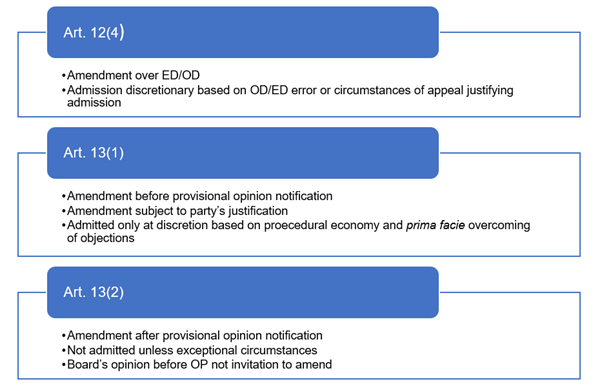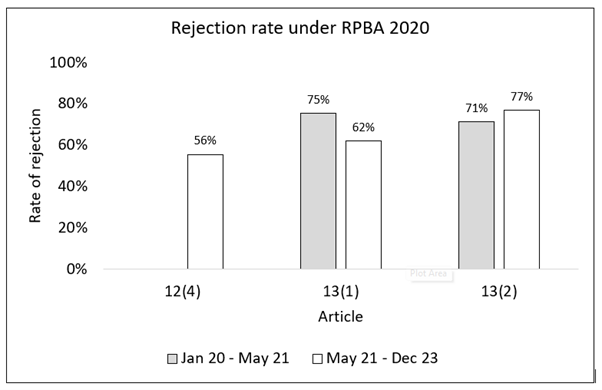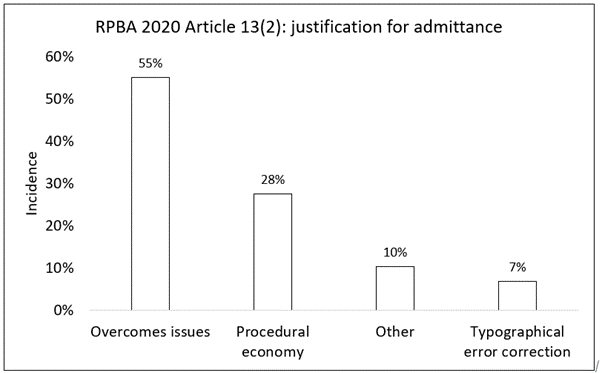Admissibility before Boards of Appeal at the EPO: Current state of play
The EPO’s Technical Boards hear appeals from decisions of the Examining and Opposition Divisions with the primary aim of providing a factual and legal review of the first instance decision and not to rehear a case de novo.
The revised Rules of Procedure of the Boards of Appeal (RPBA 2020), which entered into force on 1 January 2020, were brought in to consolidate practice and bring consistency into the exercise of discretion by the Boards. Articles 12 and 13 RPBA 2020 implement what is referred to as the "convergent approach" widely viewed as representing a significant tightening of the rules relating to admissibility. This approach, summarized in Figure 1, means that parties find it increasingly difficult to have their new documents or requests admitted as appeal proceedings progress.
On 1 January 2024, certain amendments to RPBA 2020 entered into force [1]. These amendments include a change to Article 13(2) RPBA which means that the third most onerous stage of the convergent approach now applies from notification of a communication providing the Board’s provisional opinion on the case rather than from notification of the Summons to Oral Proceedings before the Board. Since Summons to Oral Proceedings usually issue a few months before the Board’s provisional opinion, this change is likely to bring some relief to Appellants from the most stringent of the admissibility rules.

Figure 1: RPBA provisions on admissibility before Board of Appeal.
Admissibility trends under RPBA 2020
The EIP team has been periodically reviewing how the admissibility provisions of RPBA 2020 are being applied by the Boards. In 2021, we analyzed over 100 decisions involving admissibility between January 2020 and May 2021 to investigate how the new rules were being applied soon after their entry into force. We have now examined 190 further decisions from May 2021 to December 2023 to detect any changes or trends. The overall comparison is shown in Figure 2. Note that the RPBA 2020 contained a transitional provision meaning that Article 12(4) from the RPBA 2007 would still apply to cases filed before 1 January 2020. Thus, we were only able to identify 2 individual applications of Article 12(4) RPBA 2020 in the January 2020 – May 2021 dataset, and, as a result of this small sample size, this data is not portrayed in the figure.

Figure 2: Admissibility under RPBA 2020.
There appears to be a noteworthy change in how the Boards have applied Articles 13(1) and 13(2) over the two timeframes. Initially, the Boards rejected 75% of amendments under Article 13(1). In general, this seemed slightly stricter than the final level of the convergent approach under Article 13(2), which had a rejection rate of 71%. However, the data obtained from May 2021 onwards shows a more consistent picture, with initial amendments subject to Article 12(4) being rejected 56% of the time. As cases progressed, amendments subject to Article 13(1) were rejected at a rate of 62%, and finally admissions under Article 13(2) were rejected at a rate of 77%. This appears consistent with the objectives of the convergent approach to admissibility.
At the first stage of Appeal proceedings, when it comes to admissibility of claim requests under Article 12(4) EPC, it is clear from the case law that the best chance for admissibility is when such claim requests do not raise any complex new issues and clearly address a relevant objection. For Auxiliary Requests presented and maintained before appeal but not decided upon, the Board is also likely to exercise discretion favourably [2].
Admissibility under Article 13(2) RPBA
The most interesting decisions from our perspective are those where amendments to a party’s case under Article 13(2) RPBA were admitted. This is because the strictest criteria for admissibility applied and the Article effectively states that the default is that such new amendments are not to be admitted unless there are exceptional circumstances.
We have reviewed 29 cases where Amendments subject to Article 13(2), as it was prior to 1 January 2024 i.e. applying after notification of Summons as opposed to after notification of the Board’s provisional opinion, were admitted by the Boards. Figure 3 describes the primary reason cited by the Board on why the amendment was admitted into proceedings.

Figure 3: Incidence of reasons given for acceptance under Article 13(2) RPBA 2020.
The most critical factor for amendments made at such late stages appears to be that they overcome pertinent issues. This could reflect a document submission that solves a crucial point of conflict or a claim request that overcomes objections. Secondly, “procedural economy” is often noted by the Boards. In most cases, new Auxiliary Requests (ARs) from Patentee were admitted when the Board considered that such ARs addressed an objection raised at a late stage (such as in preliminary opinion of the Board) in a straightforward way [3].
In T 3013/18, an AR filed at the last stage of proceedings was admitted on the following basis:
The only amendment made to claim 1 of auxiliary request 2a is the deletion of two alternatives (see point 13.2 above). This kind of amendment is only minor, it does not introduce any new subject-matter or raise new objections requiring further consideration and can therefore not be considered as an amendment to the respondent's case.
Furthermore, the board cannot see that any disadvantage would be caused to the appellant by the late filing of auxiliary request 2a, if it was admitted into the proceedings. As explained in point 13.4.1 above, the claims of auxiliary request 2a merely recite subject-matter already embraced by the claims of auxiliary request 2. The latter has been filed in due time by the respondent in reply to the statement of the grounds of appeal and its admittance has not been objected to by the appellant. As a consequence of these findings, the board decided to admit auxiliary request 2a into the appeal proceedings.
The category of “Other” represents case-specific circumstances. The fact that such a category represents 10% of the accepted justifications reflects that extraordinary circumstances are often required for a positive admissibility decision under Article 13(2). Decision T 0955/20 which is part of this category provides an interesting example of a slightly unusual and exceptional situation, where a party had to file two appeals and pay two appeal fees to obtain review of the same decision:
The amendments made in the auxiliary request are reasonable in the sense that they do not raise major new issues or create a completely fresh case. From a strict procedural point of view, however, it could be argued that the board's objection of lack of inventive step, which is based on the same passages in document D1 as relied on by the examining division, does not give rise to an "exceptional circumstance" within the meaning of Article 13(2) RPBA 2020.
However, the board considers it appropriate to also take into account the exceptional circumstance that the appellant had to file two appeals and pay two appeal fees to finally obtain a judicial review of essentially the same decision. If the board were not to admit the auxiliary request into the appeal proceedings, the appeal would have to be dismissed, there would be no possibility of reimbursing the second appeal fee, and it would not be possible to settle this case in an equitable manner. The board therefore admits the auxiliary request into the appeal proceedings.
Side-stepping admissibility
It is worth noting that the admissibility provisions of Articles 12 and 13 RPBA only apply to new submissions at various stages of Appeal Proceedings. If a submission is considered to be a development of an existing argument, then the Admissibility discussion can be avoided. For example, in T 1035/19, the appellant requested that the board not take into account the submissions provided under points 246 to 266 of respondents' letter dated 1 September 2021. The board observed that these submissions are to be regarded as arguments which can be considered a development of the original arguments and not as an amendment to the party's case within the meaning of Article 13(2) RPBA 2020. The board thus took these submissions into account.
In T 0184/18, the appellant-patent proprietor argued in its letter of 23 June 2020 and at the oral proceedings before the Board that the main request solved every outstanding issue. This was undisputed. Furthermore, the Board was satisfied that the claims of this request were not subject of the appeal of either the proprietor or the opponent. Restricting a party's case to such subject-matter was not considered as an amendment for the purposes of Article 13(2) RPBA.
Conclusion
In the four years since RPBA 2020 came into force, the convergent approach to admissibility set out in these Rules has become embedded in the practice of the Boards of Appeal at the EPO. The third stage of the convergent approach governed by Article 13 (2) represents the highest admissibility hurdle for parties to appeal proceedings at the final stages of appeal.
The latest amendment to Article 13(2), meaning third level of convergence will run from the notification of the communication providing the Board’s provisional opinion, rather than from the date of the Summons, provides some relaxation to admissibility rules in the period between notification of Summons to Oral Proceedings and notification of Board’s provisional opinion. However, the requirements of Article 13(1) and the second stage of convergence in terms of admissibility are by no means a low bar so parties will be well advised to continue to frontload their cases and file submissions and claim requests early on in appeal proceedings wherever possible.
2. T 0615/22
3. T1191/15, T 0296/19, T 2060/20 & T 0807/21 : Amendments addressed objection raised in preliminary opinion of the Board in straightforward way; T 0397/20: Amendments addressed clarity objection raised by Opponent also after notification f summons; T 0397/20: Objection mainly discussed in Oral Proceedings before Board and deletion of some invalid claims promotes procedural economy; T 0960/15: Auxiliary request IV' filed in response to the Board's preliminary opinion overcame the problem with auxiliary request IV and no other new issues were introduced.

